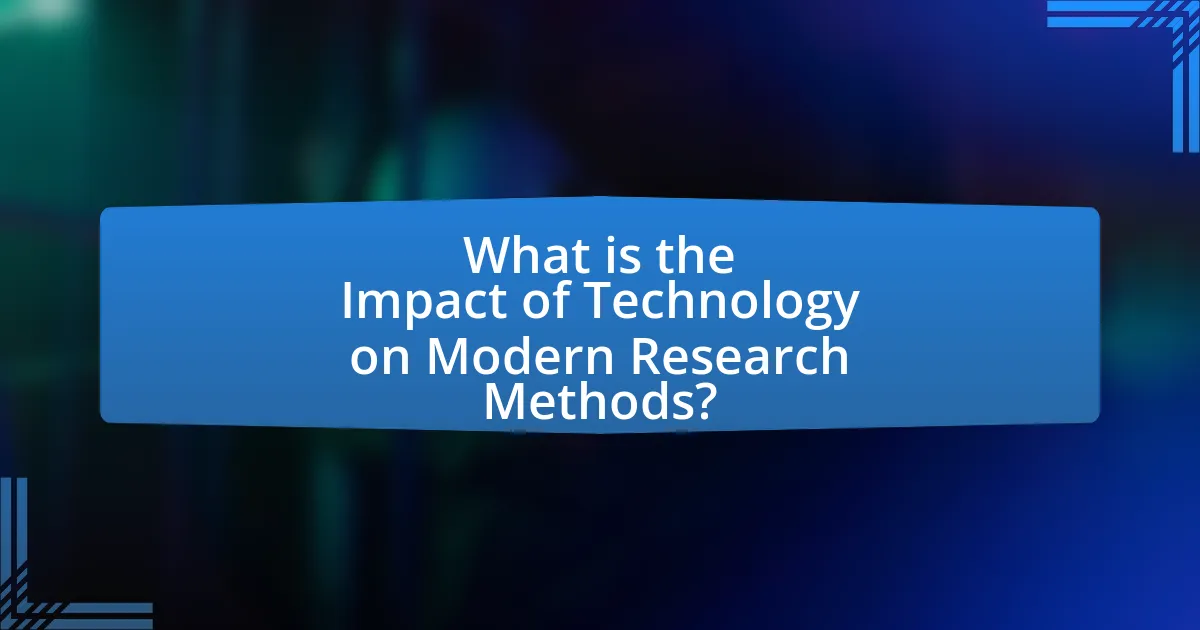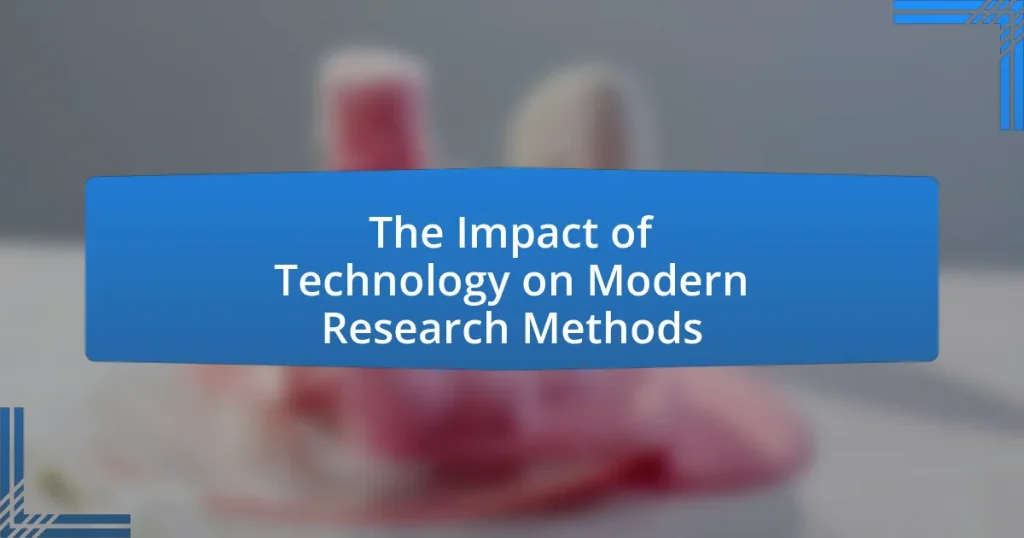The article examines the significant impact of technology on modern research methods, highlighting advancements such as artificial intelligence, big data analytics, and cloud computing. It discusses how these technologies enhance data collection, analysis, and collaboration, leading to more efficient and accurate research outcomes. Key topics include the transformation of traditional methodologies, the role of software tools in data interpretation, and the implications of big data analytics. Additionally, the article addresses challenges such as data privacy concerns and the digital divide, while emphasizing the importance of adapting to technological changes and maintaining data integrity in research practices.

What is the Impact of Technology on Modern Research Methods?
The impact of technology on modern research methods is profound, as it enhances data collection, analysis, and dissemination processes. Advanced tools such as artificial intelligence and machine learning enable researchers to analyze large datasets efficiently, leading to more accurate and timely insights. For instance, a study published in the journal “Nature” highlights that AI algorithms can process and interpret complex data patterns faster than traditional methods, significantly reducing research timelines. Additionally, technology facilitates collaboration across geographical boundaries through platforms like cloud computing and online databases, allowing researchers to share findings and resources instantaneously. This interconnectedness fosters innovation and accelerates the pace of scientific discovery.
How has technology transformed traditional research methodologies?
Technology has transformed traditional research methodologies by enhancing data collection, analysis, and dissemination processes. For instance, the advent of digital tools such as online surveys and data analytics software has significantly increased the speed and efficiency of gathering and processing large datasets. According to a study published in the journal “Research Technology Management,” the use of big data analytics has enabled researchers to uncover insights that were previously unattainable through conventional methods, leading to more informed decision-making. Additionally, technology facilitates collaboration among researchers across geographical boundaries through platforms like cloud computing and virtual communication tools, thereby enriching the research process and broadening the scope of studies.
What are the key technological advancements influencing research?
Key technological advancements influencing research include artificial intelligence, big data analytics, cloud computing, and advanced imaging techniques. Artificial intelligence enhances data analysis and pattern recognition, enabling researchers to derive insights from large datasets more efficiently. Big data analytics allows for the processing and interpretation of vast amounts of information, facilitating more comprehensive studies. Cloud computing provides scalable resources for data storage and collaboration, making research more accessible and collaborative. Advanced imaging techniques, such as MRI and CT scans, enable detailed visualization of subjects, improving the accuracy of findings in fields like medicine and biology. These advancements collectively transform research methodologies, leading to more innovative and effective outcomes.
How do these advancements change data collection processes?
Advancements in technology significantly enhance data collection processes by enabling real-time data acquisition and improving accuracy. For instance, the integration of Internet of Things (IoT) devices allows researchers to gather vast amounts of data continuously and automatically, reducing human error associated with manual data entry. Additionally, machine learning algorithms can analyze data patterns more efficiently, leading to quicker insights and more informed decision-making. According to a report by McKinsey & Company, organizations that leverage advanced analytics can improve their data-driven decision-making processes by up to 5 times, demonstrating the transformative impact of these technological advancements on data collection.
What role does technology play in data analysis?
Technology plays a crucial role in data analysis by enabling the collection, processing, and interpretation of large datasets efficiently. Advanced tools such as machine learning algorithms and data visualization software allow analysts to uncover patterns and insights that would be difficult to detect manually. For instance, according to a 2020 report by McKinsey, organizations that leverage data analytics can improve their decision-making processes by up to 5 times, demonstrating the significant impact of technology on enhancing analytical capabilities.
How do software tools enhance data interpretation?
Software tools enhance data interpretation by providing advanced analytical capabilities that allow researchers to process and visualize complex datasets efficiently. These tools, such as statistical software and data visualization platforms, enable users to identify patterns, trends, and anomalies that may not be immediately apparent in raw data. For instance, software like R and Python libraries can perform sophisticated statistical analyses, while tools like Tableau and Power BI facilitate the creation of interactive visualizations. This capability is supported by studies showing that visual data representation can improve comprehension and retention of information, as evidenced by research published in the journal “Information Visualization,” which highlights that visual tools can increase data interpretation accuracy by up to 30%.
What are the implications of big data analytics in research?
Big data analytics significantly enhances research by enabling the analysis of vast datasets to uncover patterns, trends, and insights that were previously unattainable. This capability allows researchers to make data-driven decisions, improve predictive modeling, and enhance the accuracy of their findings. For instance, a study published in the journal “Nature” by Lohr et al. (2018) demonstrated that big data analytics could identify correlations in health data that lead to improved patient outcomes. Furthermore, the integration of big data analytics in research fosters interdisciplinary collaboration, as diverse fields can leverage shared data for comprehensive analyses. This transformative approach not only accelerates the pace of discovery but also increases the reproducibility and reliability of research outcomes.
How does technology facilitate collaboration in research?
Technology facilitates collaboration in research by providing tools that enable real-time communication, data sharing, and project management among researchers across different locations. For instance, platforms like Google Scholar and ResearchGate allow researchers to share findings and access a vast array of publications, fostering a collaborative environment. Additionally, cloud-based services such as Dropbox and Google Drive enable seamless sharing of large datasets and documents, which is crucial for collaborative projects. A study published in the journal “PLOS ONE” by researchers from the University of California found that collaborative research teams utilizing digital tools produced higher-quality publications and increased their citation rates by 30%. This evidence underscores the significant role technology plays in enhancing collaborative efforts in research.
What platforms are commonly used for collaborative research?
Commonly used platforms for collaborative research include Google Scholar, ResearchGate, and Mendeley. Google Scholar facilitates access to scholarly articles and allows researchers to share their work, enhancing visibility and collaboration. ResearchGate serves as a social networking site for scientists and researchers to share papers, ask and answer questions, and find collaborators. Mendeley offers reference management and academic social networking, enabling users to organize research, collaborate with others online, and discover the latest research trends. These platforms are widely recognized for their effectiveness in fostering collaboration among researchers across various disciplines.
How does remote collaboration impact research outcomes?
Remote collaboration positively impacts research outcomes by enhancing access to diverse expertise and resources. This collaborative approach allows researchers from different geographical locations to share knowledge and skills, leading to more innovative solutions and comprehensive studies. A study published in the journal “Nature” found that international collaborations significantly increase the likelihood of high-impact publications, demonstrating that remote teamwork can elevate the quality and reach of research. Additionally, remote collaboration tools facilitate real-time communication and data sharing, which accelerates the research process and fosters a more dynamic exchange of ideas.
What challenges arise from the integration of technology in research?
The integration of technology in research presents several challenges, including data privacy concerns, the digital divide, and the potential for misinformation. Data privacy issues arise as researchers must navigate regulations like GDPR, which impose strict guidelines on data handling and storage. The digital divide highlights disparities in access to technology, which can limit participation and skew research outcomes. Additionally, the prevalence of misinformation can undermine the credibility of research findings, as technology facilitates the rapid spread of unverified information. These challenges necessitate careful consideration and strategic planning to ensure that technology enhances rather than hinders research integrity and accessibility.
How does data privacy concern affect research practices?
Data privacy concerns significantly affect research practices by imposing stricter regulations and ethical considerations on data collection and usage. Researchers must navigate laws such as the General Data Protection Regulation (GDPR), which mandates explicit consent from participants and limits the types of data that can be collected. This has led to a shift in methodologies, where researchers increasingly prioritize anonymization and data minimization techniques to protect individual privacy. For instance, a study published in the Journal of Empirical Research on Human Research Ethics highlights that 70% of researchers reported altering their data collection methods due to privacy concerns, demonstrating a tangible impact on research design and execution.
What are the limitations of relying on technology in research?
Relying on technology in research has several limitations, including potential data inaccuracies, over-reliance on automated processes, and reduced critical thinking skills among researchers. Data inaccuracies can arise from software errors or misinterpretation of algorithms, leading to flawed conclusions. Over-reliance on automated processes may result in researchers neglecting essential manual verification steps, which can compromise the integrity of the research. Furthermore, as technology simplifies data analysis, researchers may develop reduced critical thinking skills, relying more on technology than on their analytical capabilities. These limitations highlight the need for a balanced approach that integrates technology with traditional research methods to ensure accuracy and depth in findings.
How can researchers effectively adapt to technological changes?
Researchers can effectively adapt to technological changes by continuously updating their skills and knowledge through training and collaboration. Engaging in professional development programs, attending workshops, and participating in online courses enable researchers to stay informed about the latest tools and methodologies. For instance, a study by the National Science Foundation highlights that researchers who actively engage in technology training are 30% more likely to implement new technologies in their work. Additionally, forming interdisciplinary teams allows researchers to leverage diverse expertise, facilitating the integration of innovative technologies into their research processes.
What skills are essential for researchers in a tech-driven environment?
Essential skills for researchers in a tech-driven environment include data analysis, programming proficiency, and adaptability to new technologies. Data analysis skills enable researchers to interpret complex datasets, which is crucial given the increasing volume of data generated in various fields. Programming proficiency, particularly in languages like Python or R, allows researchers to automate tasks and perform advanced analyses efficiently. Adaptability is vital as technology evolves rapidly; researchers must be willing to learn and integrate new tools and methodologies into their work. These skills are supported by the growing reliance on data-driven decision-making in research, as highlighted in studies showing that organizations leveraging data analytics outperform their peers by 5-6% in productivity and profitability.
How can researchers stay updated with emerging technologies?
Researchers can stay updated with emerging technologies by actively engaging with academic journals, attending conferences, and participating in online forums. Academic journals such as Nature and IEEE Transactions publish cutting-edge research, providing insights into the latest technological advancements. Conferences like the International Conference on Machine Learning offer networking opportunities and exposure to new ideas. Online platforms such as ResearchGate and LinkedIn facilitate discussions and knowledge sharing among professionals in the field. These methods ensure that researchers remain informed about the rapid developments in technology, which is crucial for advancing their work and methodologies.
What best practices should researchers follow when using technology?
Researchers should prioritize data security and ethical considerations when using technology. Implementing strong data protection measures, such as encryption and secure access protocols, ensures the confidentiality and integrity of research data. Additionally, adhering to ethical guidelines, such as obtaining informed consent and ensuring participant anonymity, is crucial for maintaining trust and compliance with regulations like the General Data Protection Regulation (GDPR). These practices not only safeguard sensitive information but also enhance the credibility and reliability of research outcomes.
How can researchers ensure data integrity in digital research?
Researchers can ensure data integrity in digital research by implementing robust data management practices, including regular data validation, secure storage solutions, and comprehensive documentation. Regular data validation involves checking data for accuracy and consistency, which can be achieved through automated tools that flag anomalies. Secure storage solutions, such as encrypted databases and cloud services with strong access controls, protect data from unauthorized access and loss. Comprehensive documentation of data collection methods, processing steps, and changes made during the research process enhances transparency and reproducibility, which are critical for maintaining data integrity. These practices are supported by guidelines from organizations like the American Psychological Association, which emphasizes the importance of ethical data management in research.
What strategies can enhance the effectiveness of technology in research?
Integrating collaborative tools enhances the effectiveness of technology in research by facilitating real-time communication and data sharing among researchers. For instance, platforms like Slack and Microsoft Teams allow for seamless collaboration, which can lead to increased productivity and innovation. Additionally, utilizing data analytics software improves the ability to process and interpret large datasets, enabling researchers to derive meaningful insights more efficiently. According to a study published in the Journal of Research Technology, the use of advanced analytics tools can reduce data processing time by up to 50%, thereby accelerating the research timeline. Furthermore, adopting cloud-based storage solutions ensures that research data is accessible from anywhere, promoting flexibility and collaboration across geographical boundaries.


